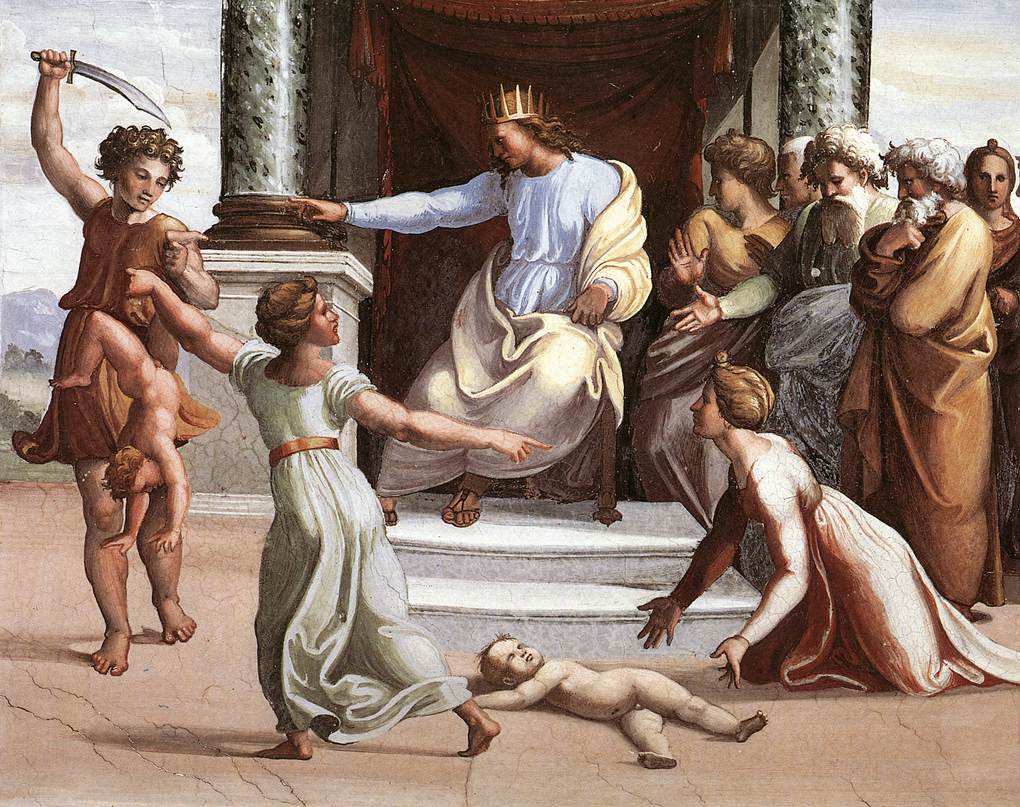
Solomon's Hyperbole
How is this story relevant for abortion today? Today we have a question pertaining to a "child." But who is making the rightful claim? How do we answer the question: "When does human life get protection of the right to keep that life? Or when does human life get to be loved, cared for, and protected from death?" Even though science has greater means to make the womb transparent and show us the beginnings of life in the womb, without an agreed upon compass of truth or an infallible word to tell us the exact day that a baby has a right to protection of life, we merely have two competing voices; this remains for some a tricky question to answer. Two people make two different claims, like the two mothers over which Solomon ruled, yet only one is right, and one bears false witness about life. One side attempts to use science as a guide to decide when life deserves love and protection, but science is really quiet when asked for the answer to this philosophical musing about the value of life, and we end up with human desire as the compass. The other side uses God's Word which speaks of God foreknowing a person even before he or she has been conceived. While science may give one several options as to when we think human life is protectable, God's Word gives only one option-all human life is precious. As in Solomon's case, only one answer is right.Truly one answer is the word of humans and one answer is the Word of the Lord who made humans. One answer brings life, the other, literal death. Nevertheless, perhaps a parallel hyperbole can help reveal truth and find folly. What is the hope of the hyperbole? That truth and justice will prevail, that the living will literally be seen as living and be spared, which will undoubtedly feel unfair to the side that does not perceive the rights of the most fragile living but only perceives the rights and will of the mother. Yet fairness, as we have seen, does not always beget truth or true justice.
In the spirit of Solomon, to those who say baby has no right to life until after it is born, I offer a precarious scenario: what if the child is half way in the mother and half way out? Imagine its feet, legs and buttocks still fully in the womb, not yet seen the light of day, and the head and neck fully out of the womb in clear view of the world, its arms still squeezing through the birth canal; is the baby only half given the right to live at this point, since it is only halfway outside of the womb, still attached to its mother's body by umbilical cord? When I was giving birth to my babies, and their heads were pushed out, did they only then have half a right to live? Could I have changed my mind to keep their life in the few minutes that remained before they made their full appearance to parents, midwife, and nurse? Could I have claimed "my rights" over "my body" at that half way moment? Or did they have full right to life? According to the logic of "baby has no rights to keep its life until after it is born," no rights to "love, and safety until birth," in that scenario, baby truly only has half rights, for it is not yet fully born. But what are half rights, you may ask? What is half a child? There is no such thing, of course.
Further thinking: If we take the Word of the Lord of Life above Human desire, what do we do with other precarious scenarios? Of course there are real and rare cases where the life of mother or child or both are endangered during birth or prior to birth and decisions to preserve one life over the other must be made; but even in these rare cases, the life that is sacrificed is seen as just that, a loss of life, a tragedy, and a sacrifice.
There is an argument that a woman should not bring a baby into the world until she was ready to love or care for him or her, yet, there are options, without depriving a baby of his or her already in motion life, there are people waiting to adopt and love a child and to call that child their very own.
A woman may feel that she is doing the right thing by sparing the baby life because she has made a mistake or is not ready to be a mother, but in any other circumstance, it is not right to kill in order to have a good outcome at the end of it. It is not right for me to kill a person just because it will make their life or my life easier or free from suffering.
Babies who are "born" alive during an attempted abortion. What do we do? Well, there is little left to do but to finish the job of ending its life. Does this sound moral, ethical, humane? Well, according the to the laws of evolution, it is actually a very acceptable thing to do. In an evolutionary stance, what law prevails against the will of a human being? Only the State's laws are higher, and it is the law to kill babies in the womb; but outside of the womb-I hope this sounds appalling.
There is forgiveness for anyone who confesses to the Lord, who will grieve over their sin, who will turn to the living Lord and be washed and cleansed by His Son and seek to walk in His way thereafter. There is no sin so great that it cannot be forgiven.
No comments:
Post a Comment